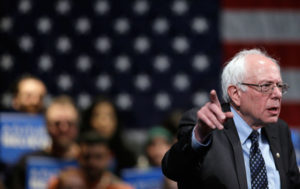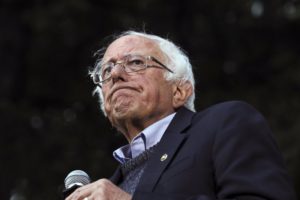The Second Democratic Debate: Foreign Policy, Guns, Wall Street and Campaign Finance (Updated)
The three major Democratic candidates found solid footing in the second half of Saturday’s debate, with Sanders and O’Malley challenging Clinton over Wall Street, campaign finance and gun deaths in the United States. Updated CBS News
CBS News
CBS News
Update: 11 p.m. EST
The three major Democratic candidates found solid footing in the second half of Saturday’s debate, with Bernie Sanders and Martin O’Malley challenging Hillary Clinton over Wall Street, campaign finance and gun deaths in the United States.
The exchange began with the moderators asking Clinton to explain why voters should trust her to govern the very banks that are funding her campaign for the presidency. Without giving details, she responded that she’s “got a comprehensive, tough plan” to regulate banks, and she asserted that her “proposal is much more comprehensive than anything put forth” by the other candidates.
Sanders said of Clinton’s plan, “It’s not good enough,” adding that major banks have financial assets equivalent to the annual gross domestic product of the United States and therefore have to be broken up into smaller, more accountable institutions. “Community banks and credit unions — that is the future of banking in America.” Clinton responded by asserting again that her plan was “tougher, more effective and comprehensive” than her competitors’.
Sanders returned to his theme of the United States’ “corrupt campaign finance system.” In an implicit criticism of Clinton, he said, “We need to show by example that we’re prepared not to rely on corporations and Wall Street.” O’Malley said that the nation needs new economic thinking and implied that Clinton as president would be taking her orders from Wall Street. Clinton disagreed. “If the big banks don’t play by the rules” she would punish them, she said. “And I will also go after the executives whose decisions” threaten the economy. An incredulous Sanders erupted, saying Wall Street did play by the rules in the runup to the 2008 crash. “Here’s my promise,” he said. “Wall Street representatives will not be in my Cabinet.”
The debate then turned to gun violence. Asked to point out the difference between Sanders and herself on gun control, Clinton said that Sanders’ votes in Congress gave the gun lobby more power, and she rattled off a litany of gun death statistics. Sanders responded that he had voted multiple times for background checks for gun buyers and with a strong, hoarsening voice said he would work to improve legislation. O’Malley disagreed with an assertion by Sanders that there was little difference among the candidates on gun issues, citing both of his opponents’ voting records. Sanders said a consensus among Americans needs to be built around the question of what to do. Clinton said consensus already exists in the form of polls showing public demand for background checks.
A Twitter user chimed in, criticizing Clinton for using her support for New Yorkers in the aftermath of 9/11 to evade a question about how she can be expected to hold Wall Street accountable when she takes its contributions. O’Malley said candidates can’t represent both Wall Street and Main Street. * * *
Sanders was asked how his “revolution” would attract needed Republican support. He replied that he was calling on Americans to come together over issues they care about, and that this by definition includes the concerns of conservatives. “What we need is leadership in the country which revitalizes American democracy.” If we take on the billionaire class, he said, we can bring about the change we need, adding that polls show he’s more popular than Clinton among younger people.
Clinton agreed that more Americans need to get involved and credited Sanders with “lighting a fire under many people.” She said she too would focus on issues all Americans care about and insisted that the differences between the Democratic candidates were trivial compared with what Republicans were proposing.
Asked about race, an issue that has not been a strong point of Sanders’ campaign, the Vermont senator cited statistics that paint a picture of the plight of black Americans.
Clinton was asked if the recent wave of campus activism was justified. She responded that she “appreciates the way young people are standing up and speaking out” and said that the protests show a deep sense of concern and despair felt by young people, particularly Americans of color. She then listed the names of many of the black Americans killed by U.S. police in recent months and made a nonspecific pledge to pursue the interests of black Americans.
Sanders was asked if his university finance proposals would not entail a throwaway of wealth. He responded that his proposals would be an investment in America because they would give hope and relief to millions of young people, in addition to enabling them to be more productive contributors to the U.S. economy.
O’Malley and Clinton both voiced disagreement with Sanders’ proposal to make college tuition-free. O’Malley vaguely alluded to financial jiggering that might make college more affordable. Clinton said she wanted to make community college free and that taxpayers should not be funding the education of Donald Trump’s children.
Asked if it is realistic to think that the $1 trillion health care industry can be undone, Sanders responded that that wouldn’t happen immediately and it wouldn’t happen at all unless the corrupting influence of money was eliminated. Clinton asserted again that the real issue was the Republicans. Sanders agreed — Republicans are blocking President Obama’s Affordable Care Act at state levels — but said the question Americans should ask themselves in determining which Democratic candidate they should support is whether health care should be made a legal right rather than the privilege of those who can afford it. * * *
One of the moderators noted that every president eventually faces a crisis that cannot be anticipated. The candidates were asked: What experience have they had that demonstrates their capability in such a situation? Clinton cited her time in the White House Situation Room during the mission that assassinated al-Qaida leader Osama bin Laden. O’Malley suggested that various challenges he faced in government at the state level were sufficient to prepare him for a crisis. Sanders cited his experience with military veterans’ issues, saying that he had worked with Republicans to enact one of the most meaningful pieces of veteran legislation in U.S. history after they rejected a more powerful bill that he favored.
Closing statements were made. O’Malley urged unity around new ideas and his campaign to move the country forward. Clinton said, vaguely, that she would be obligated as president to think about everything that she could do to improve the lives of ordinary Americans. Sanders returned to his themes of fixing horrendous inequality, the corrupt campaign finance system, a broken health care system, childhood poverty and inadequate services for families.
— Posted by Alexander Reed Kelly. * * *
After a moment of silence to honor the victims of the Paris terrorist attacks, the second Democratic debate of the 2016 presidential campaign was kicked off in Des Moines, Iowa, with national security and Islamic State the focus of the Saturday event.
Watch CBS News’ live-stream coverage here.
Update: 9:21 p.m. EST: No more Mr. Nice Bern: Sanders took a jab at Hillary.
Sanders was asked whether he stands by his statement that climate change is still the most pressing national security issue. “Absolutely,” he replied. “Climate change is directly related to the growth of terrorism.”
But, hitting at Clinton, he added, “I don’t think any sensible person would disagree that the invasion of Iraq led to the massive instability that we are seeing right now.” Noting that he opposed the 2003 entry into Iraq, Sanders said the invasion “unraveled” the region. Clinton supported the invasion when she was in the Senate but apologized for that position during her 2008 campaign. * * *
Update: 9:19 p.m. EST: Clinton largely disowned the role of the United States in the current Islamic State crisis: “I don’t think that the United States has the bulk of the responsibility.”
“Face the Nation” host and principal debate moderator John Dickerson’s first question went to Clinton — did President Barack Obama underestimate the Islamic State threat?
“ISIS is the leading threat of an international network. It cannot be contained, it must be defeated,” Clinton said. Downplaying the role of the U.S., Clinton continued: “I don’t think that the United States has the bulk of the responsibility. I really put that on Assad [Syrian President Bashar al-Assad] and on Maliki [former Iraqi Prime Minister Nouri al-Maliki], and on the region itself.”
* * *
To kick off the debate, Democratic candidates Hillary Clinton, Bernie Sanders and Martin O’Malley gave one-minute opening statements, presented here in condensed form.
Sanders: “We’re shocked and disgusted by what we saw in Paris. This country will rid our planet of ISIS. I travel the country talking to people and they say the economy is rigged. Campaign finance is corrupt. Join the political revolution.”
Clinton: “Our prayers are with the people of France. But that is not enough. We need to have a resolve that will bring the world together to root out the kind of radical jihadist ideology that motivates organizations like ISIS. I will be laying out in detail what I think we need to do to do a better job of coordinating efforts against the scourge of terrorism.”
O’Malley: My heart goes out to the people of France in this moment of loss. Parents and sons and daughters. We must remember this. This is a new face of conflict and warfare. We must anticipate these threats. It requires new thinking and fresh leadership. As a mayor and governor I thought of the threat of a surprise attack every day.”
— Posted by Roisin Davis.
Your support matters…Independent journalism is under threat and overshadowed by heavily funded mainstream media.
You can help level the playing field. Become a member.
Your tax-deductible contribution keeps us digging beneath the headlines to give you thought-provoking, investigative reporting and analysis that unearths what's really happening- without compromise.
Give today to support our courageous, independent journalists.






You need to be a supporter to comment.
There are currently no responses to this article.
Be the first to respond.